Stormont talks: NI Secretary Smith to brief Johnson on progress
- Published

If agreement is not reached by 13 January, a fresh assembly election could be called
The Northern Ireland secretary has returned to London to update the prime minister on power-sharing talks.
Northern Ireland's parties must reach a deal by 13 January, or a fresh election could be called.
NI has been without devolved government since January 2017, when the DUP and Sinn Féin split in a bitter row.
Several Stormont sources described a meeting of the party leaders on Monday as "tetchy," a "total shouting match" and "riotous".
But at a press conference, Sinn Féin's Conor Murphy played down the reports of an angry meeting, suggesting there are always bad days in negotiations and that the final outcome is key.
The talks, aimed at breaking almost three years of political deadlock, resumed last Thursday.
NI Secretary Julian Smith will talk to Boris Johnson about the process and "highlight the consequences of failure", government sources say.
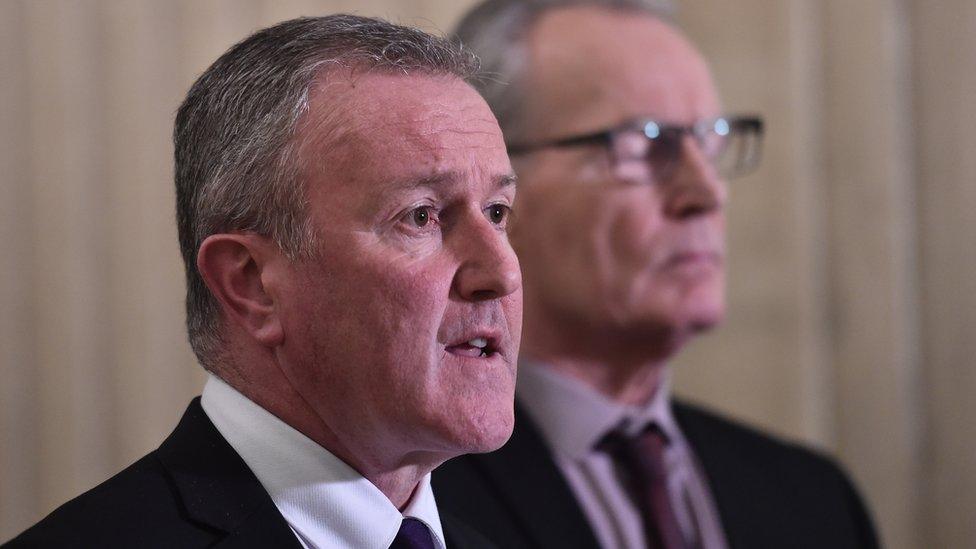
Sinn Féin's Conor Murphy plays down reports of an angry meeting of party leaders at a press conference on Monday
Mr Smith is set to attend a cabinet meeting on Tuesday before returning to Stormont.
It is understood the parties have reached agreement on a future executive's priorities, and that there is also consensus about prioritising the health crisis.
The text of a draft deal is likely to be tabled later this week.

Analysis:
BBC News NI political reporter Jayne McCormack
One week left to reach a deal, and very little optimism about that prospect.
"Tetchy," "total shouting match" and "riotous": that's how several Stormont sources described a meeting of the party leaders on Monday morning.
The talks continue, we are told, but it is far from clear where they will go over the course of the next seven days.
Allow X content?
This article contains content provided by X. We ask for your permission before anything is loaded, as they may be using cookies and other technologies. You may want to read X’s cookie policy, external and privacy policy, external before accepting. To view this content choose ‘accept and continue’.
Deal? Another delay? Election?
All possible options, but right now most people you ask at Stormont are unwilling to make a firm prediction.

The NI secretary reminded the parties on Monday that restoring devolution was in the best interests of Northern Ireland, government sources say.
Proposed legislation for an Irish language act and reforming the petition of concern, the assembly's controversial veto system, are among the key sticking points in the ongoing talks.
The parties held round-table talks with Mr Smith on Monday morning, and bilateral discussions between the parties will continue throughout the day.
Over the weekend, the NI secretary met some of the parties and Irish language campaigners.
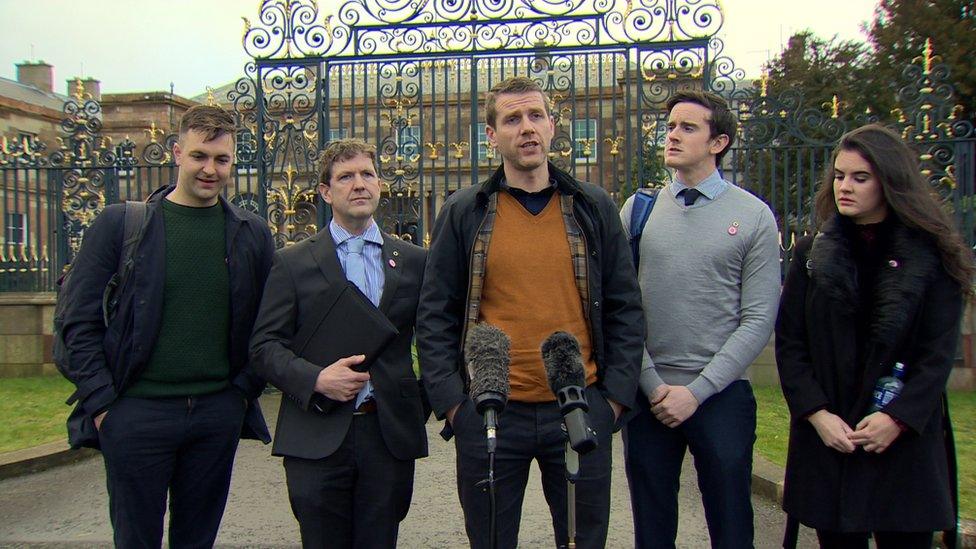
Irish language campaign group Conradh na Gaeilge met Secretary of State Julian Smith at Hillsborough Castle
On Sunday, Irish language group Conradh na Gaeilge described its meeting with Mr Smith as "productive" and that it got "a fair hearing".
The campaign group said there was no "legitimate justification for denying" Irish language legislation.
On Sunday, DUP East Londonderry MP Gregory Campbell said the 13 January deadline "will be used as leverage to get any type of deal over the line as opposed to detailed consideration in order that a good deal is achieved".
He added: "Whether it is one party making unacceptable demands, or other parties standing side by side to accept that the unreasonable demand is met, will make no difference to us."
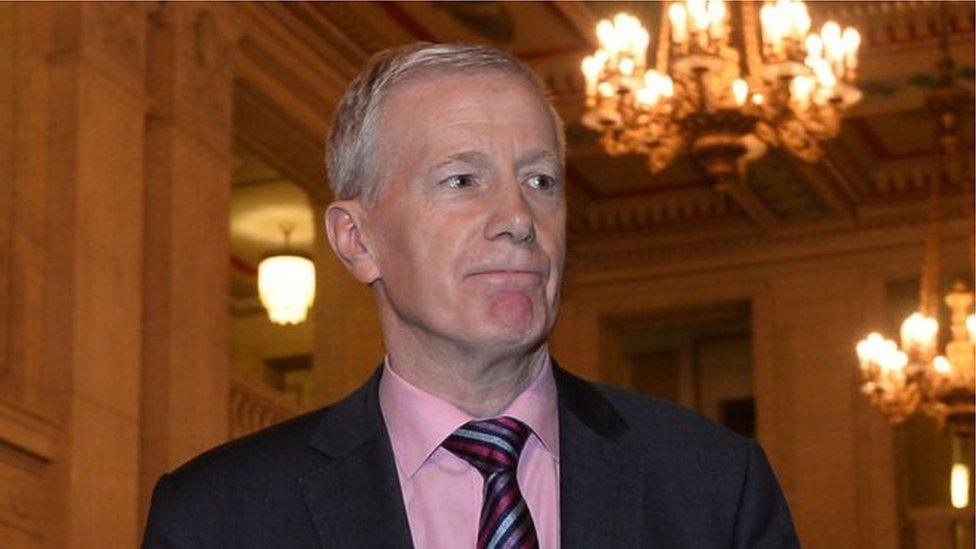
Gregory Campbell said the 13 January deadline "will be used as leverage to get any type of deal over the line"
Mr Campbell, who is opposed to an Irish language act, said the language "has a perfectly acceptable place in Northern Ireland society".
"Where there is an unacceptable demand to elevate it above all other minority languages, whether it is Sinn Féin, other parties or HM government saying we will have to yield on this issue as it is preventing devolution returning, we will not do so."
In a tweet, Sinn Féin chairperson and South Antrim MLA Declan Kearney described Mr Campbell's remarks as "unionist rhetoric".
'Nothing to do with linguistics'
Traditional Unionist Voice (TUV) leader Jim Allister said there was no need or justification for an Irish language act, claiming the sector was already "over-feted".
He pointed to the education of children in Irish.
He added that he felt such an act would have "nothing to do with linguistics".
"It has everything to do with politics, and the politics of a weaponised demand for an Irish language act is about de-Britishising Northern Ireland, making it a more uncomfortable place for unionists in their own land."
People Before Profit MLA Gerry Carroll said an assembly election should be called to "allow people to have their say on who represents them at Stormont".
"Any deal struck to reform the assembly must address the key issues of public sector pay, welfare reform and the climate crisis," he added.
Allow X content?
This article contains content provided by X. We ask for your permission before anything is loaded, as they may be using cookies and other technologies. You may want to read X’s cookie policy, external and privacy policy, external before accepting. To view this content choose ‘accept and continue’.
Why is the talks deadline 13 January?
Since Stormont collapsed, civil servants have been running day-to-day operations - but have needed Westminster to pass some legislation for some areas they do not have powers over.
In July, the government extended a law that gives civil servants flexibility to take certain decisions, but that runs out on 13 January 2020.
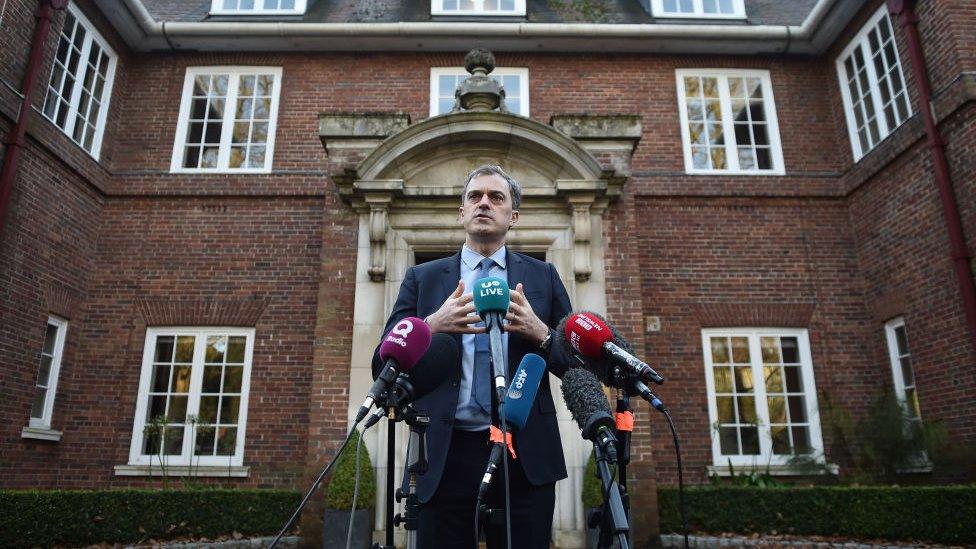
NI Secretary of State Julian Smith has insisted he will call an election if agreement is not reached
The government then has two options if devolution is still not restored: bring forward another new bill to push back the date, or call a fresh assembly election.
In the past, it has opted to pursue legislation but Mr Smith has insisted he will call another poll if the parties do not reach a breakthrough by 13 January.
Discussions were paused over the Christmas holidays after DUP was accused of holding up a deal.
- Published10 January 2020

- Published16 December 2019
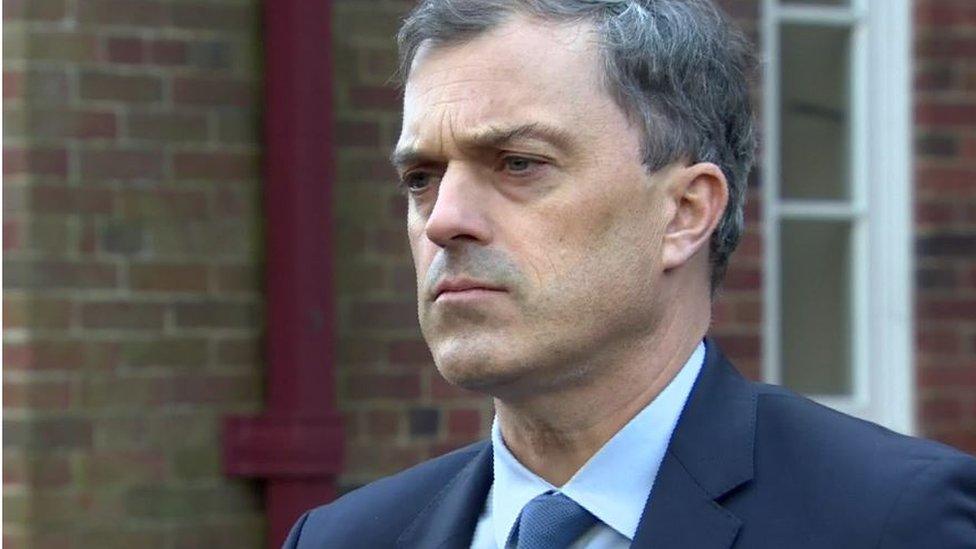
- Published21 October 2019

- Published14 December 2019
